15 Common Types of Bathroom Tiles (With Pictures)
-
Ed Malaker
- Last updated:
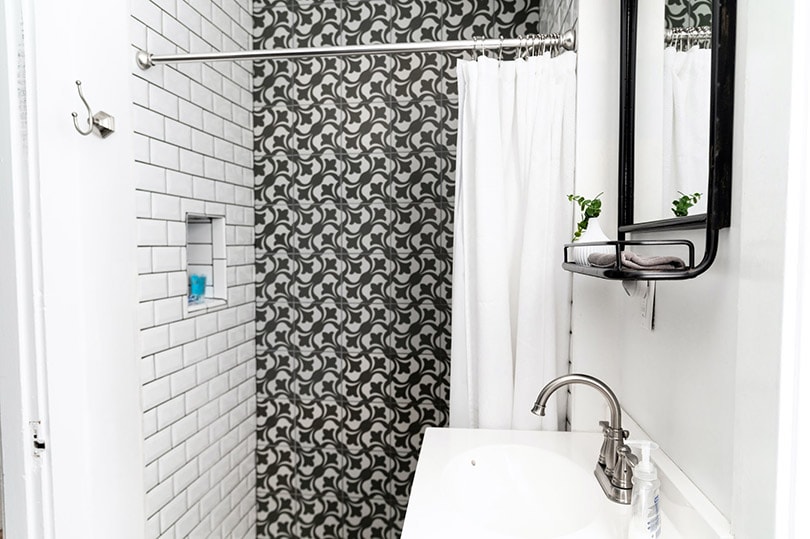
Changing the tile in your bathroom can make a huge difference in its overall appearance — even a small amount of work can make an old room look new. However, with so many types of tiles available, it can be difficult to know which ones are best for the bathroom. Keep reading as we list several tiles that people commonly add to their bathrooms and the pros and cons of each, so you can make an informed decision.
 Top15 Types of Bathroom Tiles
Top15 Types of Bathroom Tiles
1. Ceramic Tiles
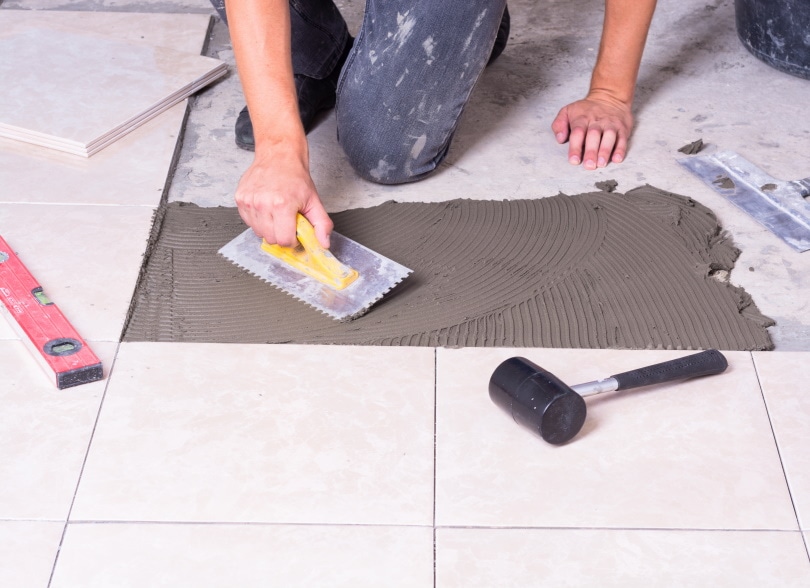
| Basis: | Clay |
Ceramic tile is one of the most common tiles that you will see anywhere in the home. These tiles are affordable and highly durable. You can also find them in a wide range of colors, patterns, and sizes, so it is easy to create something unique. Many people also like that these tiles are easy to clean.
The downside to ceramic tiles is that they are quite heavy, making them a hassle to store and hang. They also get slippery, so they might not be the best choice for bathroom floors unless you intend to use a floor mat. These tiles are also quite porous, so you will need to purchase a brand with water-resistant glazing to use them in a humid environment like the bathroom.
- Affordable
- Many options
- Easy to clean
- Durable
- Heavy
- Slippery
- Porous
2. Terracotta Tiles
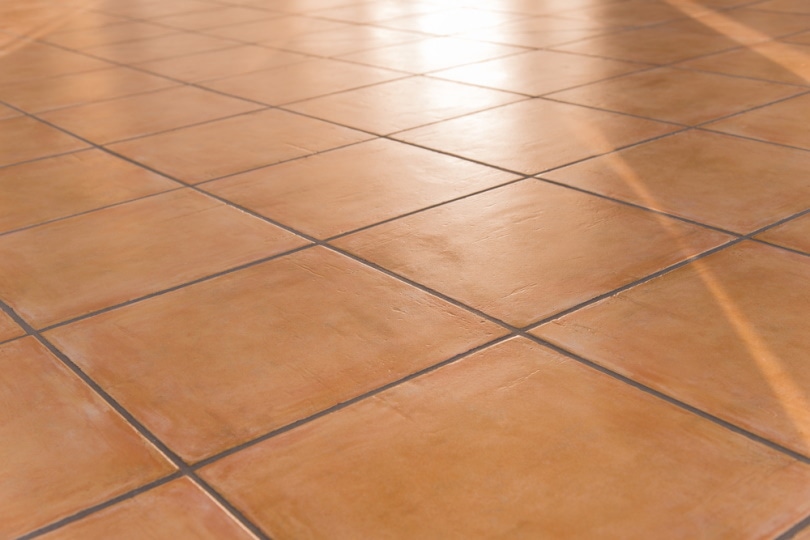
| Basis: | Clay |
Terracotta tiles are clay-based tiles that you can use in the bathroom to achieve an attractive Old World or Mediterranean look. Red clay is used in the ingredients, giving them a distinctive appearance. These tiles are naturally resistant to mold and bacteria growth and are durable enough to last for several decades. Another great feature about these tiles is that they tend to feel warm, unlike their ceramic cousins that often feel cold.
The downside to terracotta tiles is that they are porous, so you will need to seal them frequently, making them a high-maintenance choice.
- Mediterranean appearance
- Feel warm to the touch
- Durable
- Resistant to mold and bacteria
- Porous
- High maintenance
3. Porcelain Tiles
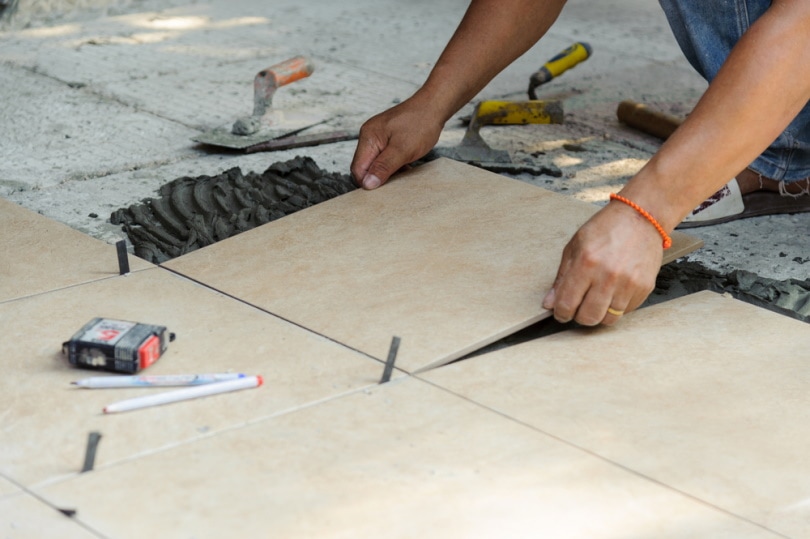
| Basis: | Clay |
Porcelain tiles are dense and one of the few varieties suitable for use in the shower due to their ability to resist moisture. These tiles are durable and easy to clean. Another thing many people like about these tiles is that the color doesn’t fade as much as other tiles. Another great option about these tiles is that they are easy to repair if one breaks or cracks.
Since porcelain tiles are high quality, you can expect them to be pricier than more common varieties. This tile is also hard to cut due to its density, so you may need special tools or a professional cutter to use these tiles. Another problem is that they get quite slippery when wet, so you will need to add a bathmat or two if you use these tiles in the bathroom.
- High-quality tile
- Moisture resistant
- Durable
- Easy to clean
- Difficult to cut
- Slippery when wet
- Expensive
4. Limestone Tiles
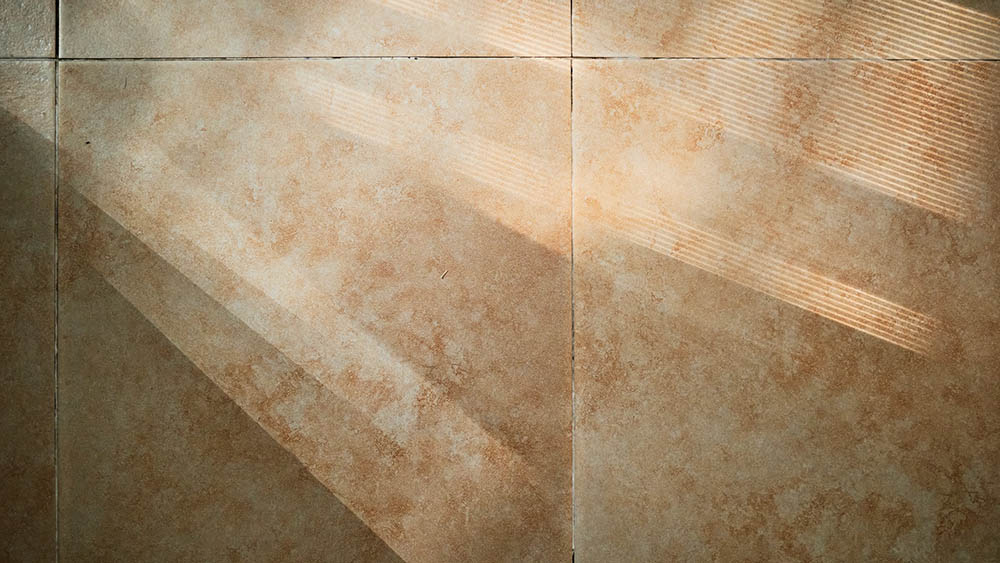
| Basis: | Calcium carbonate salt |
Limestone tiles are an inexpensive and natural option that enables you to choose between many different colors and patterns. It provides an earthy tone to your bathroom and will last many years with routine maintenance. Many people also notice that limestone doesn’t show as much wear and tear as other tiles.
The downside to limestone tiles is that you need to seal them frequently to keep them looking their best, making them a high-maintenance option. These tiles are also heavy and difficult to install.
- No signs of wear
- Easy to repair
- Durable
- Inexpensive
- High maintenance
- Heavy
5. Granite Tiles
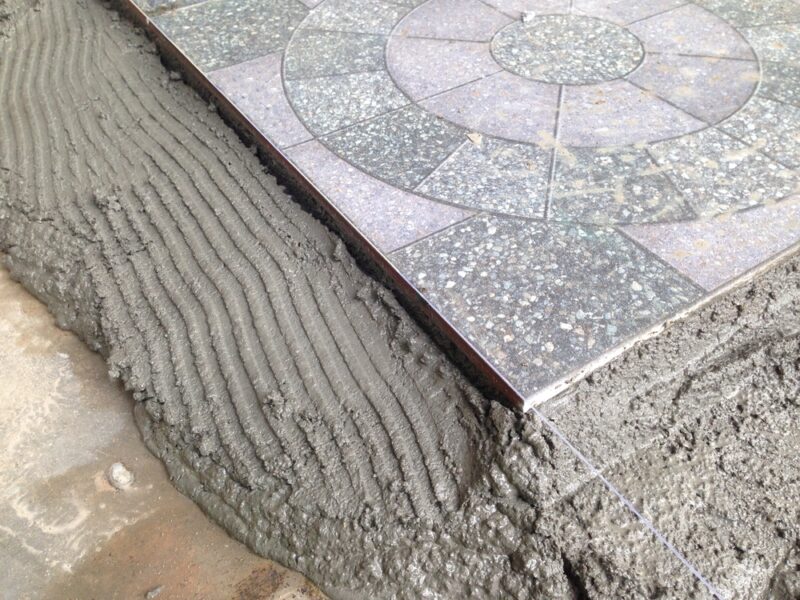
| Basis: | Calcium carbonate salt |
Granite is a great option if you have the budget to get it. It’s extremely durable and can easily last your entire lifetime. It’s also strong, so you won’t have to worry about it cracking or breaking. It’s also scratch resistant and can even raise the property value of your home.
The downside to granite tiles is that they can be quite expensive to purchase and install. They are also sensitive to many chemicals, so it can be difficult to clean them, and they are incredibly heavy, making them difficult to install.
- Extremely durable
- Scratch resistant
- Strong
- Can increase property value
- Heavy
- High maintenance
- Expensive
6. Mosaic Tiles
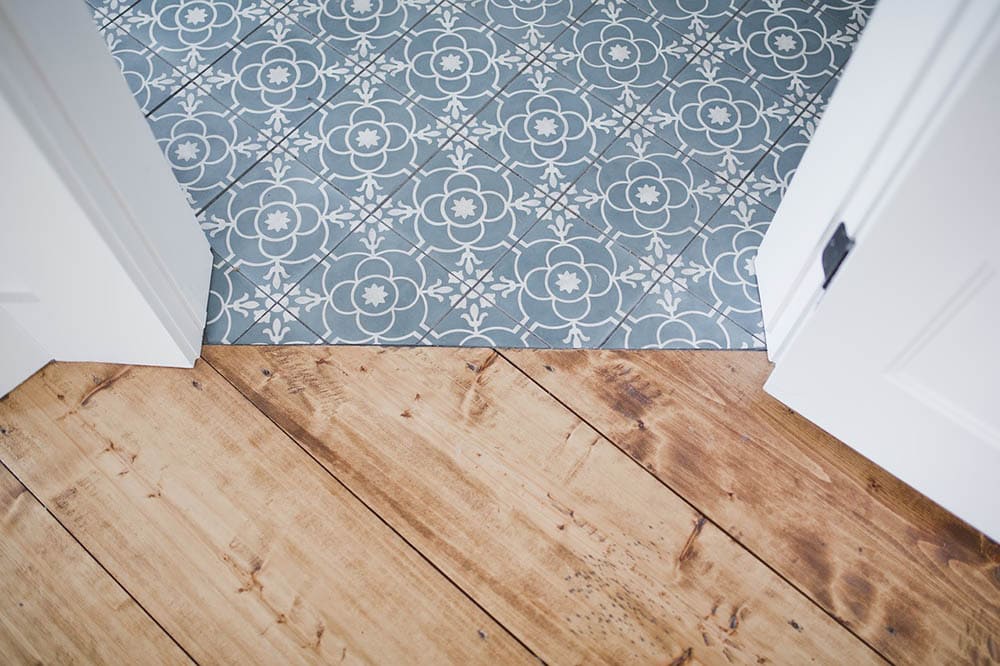
| Basis: | Any |
Mosaic tiles refer to the shape of the tile and not the type. These are small, and you can use them to create intricate designs and images that will help your bathroom stand out. You can get mosaic tiles in many colors, and they are usually easy to clean and inexpensive.
The downside to mosaic tiles is that they are not that durable because they are small, and tiles on the floor often crack, especially if you drop something on them. These tiles also tend to get slippery in the presence of water.
- Attractive
- Many colors
- Easy to clean
- Inexpensive
- Not as durable as some other options
- Slippery when wet
7. Marble Tiles

| Basis: | Marble |
Marble tiles are favorites for many people because they provide a natural finish that is difficult to achieve with other options. These tiles usually have unique patterns that help them stand out even from each other and are easy to clean.
The downside to marble tiles is that they’re porous, so you will need to seal them frequently, making them a high-maintenance option. They’re also prone to scratching and are more expensive than most other types of stone.
- Natural stone appearance
- Many colors
- Easy to clean
- Requires frequent sealing
- Prone to scratching
- Expensive
8. Slate Tiles

| Basis: | Slate |
Slate tiles are a great choice for people who want a natural tile, and they are extremely durable and can last many years without showing signs of wear. They’re resistant to scratches and dents, and the dark color hides dirt, making it easy to keep them clean.
The downside to slate tiles is that they are expensive, and while their rough surface looks attractive, they can be uncomfortable to stand on, especially with bare feet.
- Extremely durable
- Resistant to scratches and dents
- Hides dirt
- Low maintenance
- Expensive
- Rough surface
9. Glass Tiles
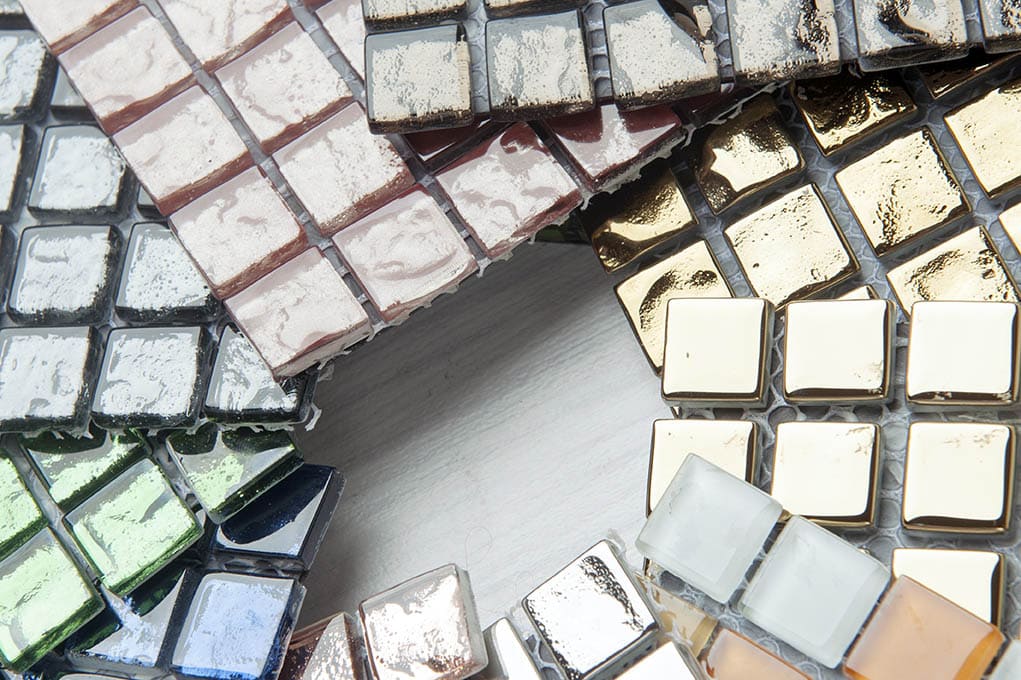
| Basis: | Glass |
Glass tiles are great for the shower because they are one of the only waterproof tiles. They’re also ideal for a humid bathroom. These tiles come in many colors, are easy to clean, and are mold and mildew resistant.
The downside to glass tiles is that you need to hire a professional to install them. Glass tiles also get extremely slippery when wet.
- Extremely durable
- Resistant to scratches and dents
- Hides dirt
- Low maintenance
- Expensive
- Rough surface
10. Pebble Tiles
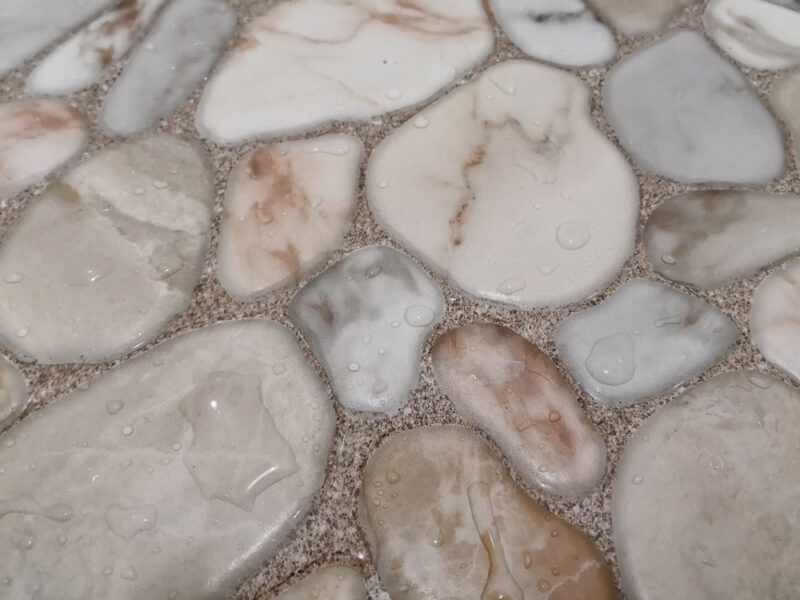
| Basis: | Rock |
Pebble tiles are similar to mosaic tiles, but they attempt to create a more natural look that resembles a beach or walkway. The highly textured surface helps prevent slipping, and water won’t penetrate or damage the pebbles, so they work well for indoor or outdoor showers.
The downside is that you will need to seal the surface frequently to protect it from moisture damage. It can also be difficult to clean around the individual pebbles, and many people find it uncomfortable to stand on them with bare feet.
- Texture surface
- Unique appearance
- Works for indoor and outdoor showers
- Frequent sealing
- Hard to clean
- Uncomfortable to stand on
11. Vinyl Tiles
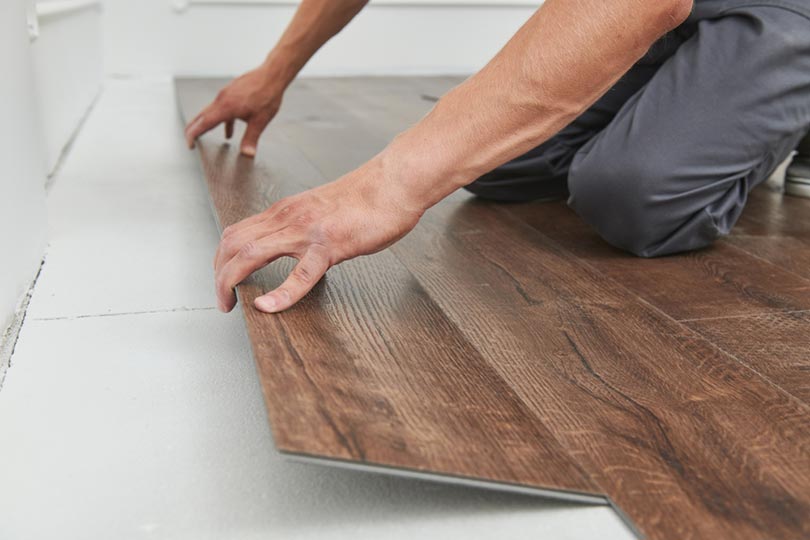
| Basis: | Vinyl |
Vinyl tiles are a more modern style that is easy to install, with many peel-and-stick options. The vinyl material will not enable water to pass through, making it a great choice for the bathroom. There are many colors and patterns available, so you can find something that you like, and they’re also quite affordable.
The downside to vinyl tile is that it is not as durable as many other options, and you might find yourself replacing it more often. It’s also susceptible to puncture and scratches, enabling moisture to reach the wall behind.
- Affordable
- Easy to install
- Many options
- Waterproof
- Not that durable
- Easy to scratch
12. Laminate Tiles
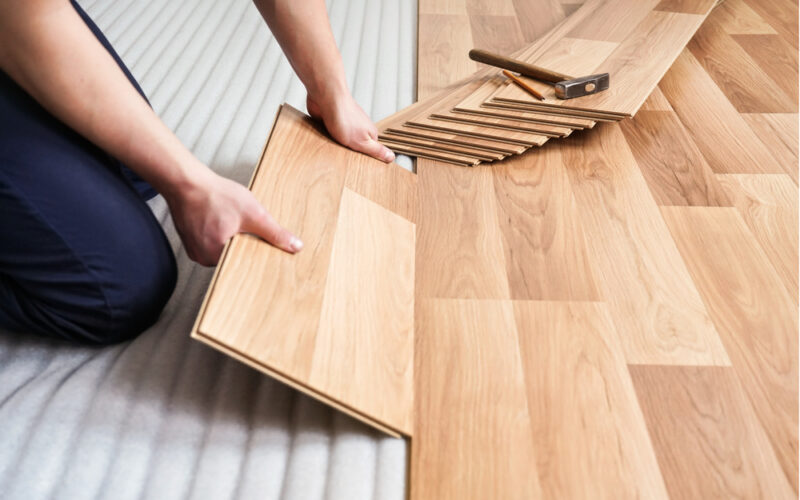
| Basis: | Composite material |
Laminate tiles are affordable and come in many color, shape, and design options. They’re easy to install and to clean.
The downside to laminate tile is that it uses many chemicals in its construction and is susceptible to water damage. It’s also quite thin, so it can be hard on bare feet.
- Affordable
- Easy to install
- Many options
- Not that durable
- Susceptible to water damage
13. Linoleum Tiles
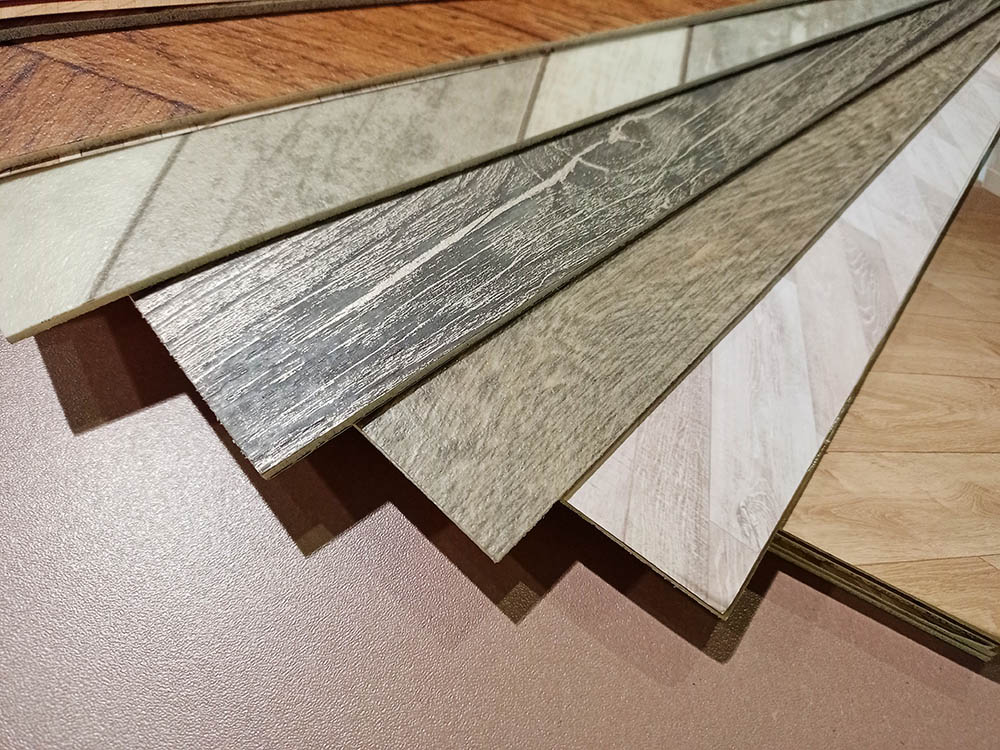
| Basis: | Composite material |
Linoleum is a low-cost synthetic tile similar to vinyl and laminate but will usually hold its color better as time passes than the other options. It’s easy to install and provides more cushion than laminate, making it more comfortable. It’s also environmentally friendly.
The downside is that this soft material is easy to scratch and puncture. Bright light can tint the tile yellow, and the tiles might also produce an odor up to a month after you install it that many people don’t enjoy.
- Affordable
- Easy to install
- Soft
- Not that durable
- Susceptible to scratches and punctures
14. Cork Tile
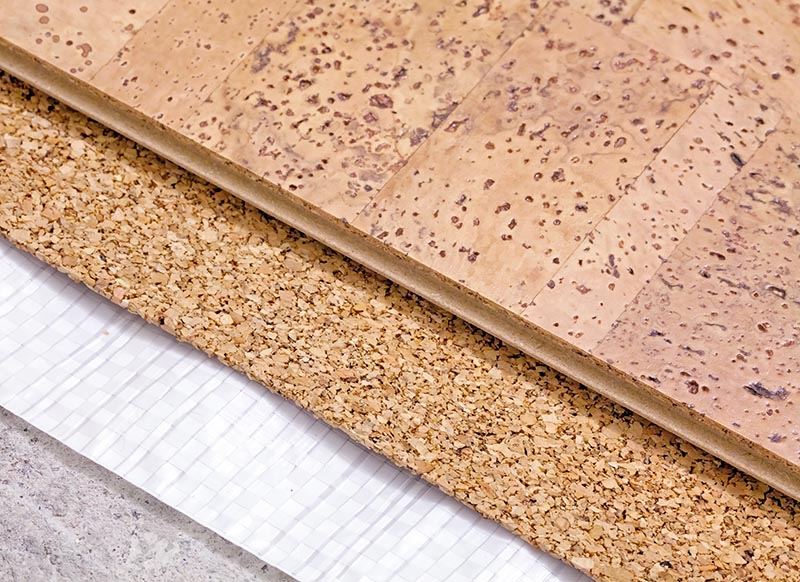
| Basis: | Cork |
Cork is a great option for someone looking to be more environmentally friendly. This inexpensive material is soft, so it’s quite comfortable to stand on and is surprisingly durable. Cork also acts as a good sound blocker, preventing noise from entering or escaping the room.
The downside to cork is that it is vulnerable to sharp objects. It’s also porous, so you will need to seal it frequently, increasing your workload.
- Environmentally friendly
- Comfortable to stand on
- Noise reduction
- Not that durable
- Frequent sealing required
15. Travertine Tiles
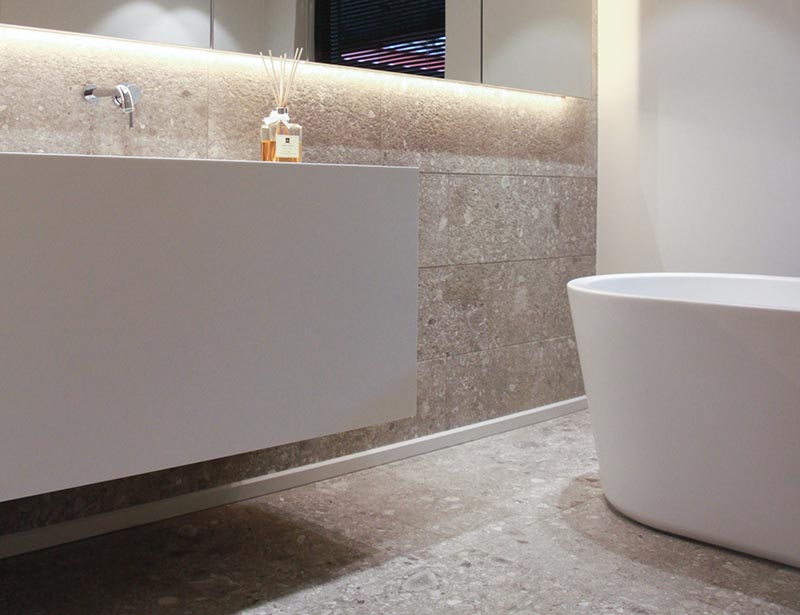
| Basis: | Limestone |
Travertine is a type of limestone that you often find around hot springs, usually in a white, tan, or cream color, though a rusty color is also available. It’s extremely durable, and you can repair it easily if it breaks. Another excellent feature of this material is that it isn’t slippery, even when it gets wet.
The downside to travertine files is that they are quite heavy, so most people pay a professional to install them. They also create a cold surface and stain easily.
- Not slippery
- Durable
- Repairable
- Heavy
- Cold
- Stains easily
Summary
There are several different kinds of tile that you can use in your bathroom to achieve any look that you want. You likely want to start with a brand that does a good job of repelling water. Our favorites include porcelain and glass. Linoleum and vinyl also make good budget-friendly options. Many of the other choices on this list will also work well, but you will need to seal them frequently to protect them from moisture.
Featured Image Credit: Andrea Davis, Unsplash
Contents
 Top15 Types of Bathroom Tiles
Top15 Types of Bathroom Tiles